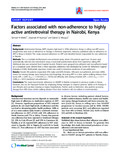| dc.description.abstract | Antiretroviral therapy (ART) requires high-level (> 95%) adherence. Kenya is rolling out ART access
programmes and, issue of adherence to therapy is therefore imperative. However, published data on adherence to
ART in Kenya is limited. This study assessed adherence to ART and identified factors responsible for non adherence
in Nairobi.
This is a multiple facility-based cross-sectional study, where 416 patients aged over 18 years were
systematically selected and interviewed using a structured questionnaire about their experience taking ART.
Additional data was extracted from hospital records. Patients were grouped into adherent and non-adherent based
on a composite score derived from a three questions adherence tool developed by Center for Adherence Support
Evaluation (CASE). Multivariate regression model was used to determine predictors of non-adherence.
Overall, 403 patients responded; 35% males and 65% females, 18% were non-adherent, and main (38%)
reason for missing therapy were being busy and forgetting. Accessing ART in a clinic within walking distance from
home (OR = 2.387, CI.95 = 1.155-4.931; p = 0.019) and difficulty with dosing schedule (OR = 2.310, CI.95 = 1.211-
4.408, p = 0.011) predicted non-adherence.
The study found better adherence to HAART in Nairobi compared to previous studies in Kenya.
However, this can be improved further by employing fitting strategies to improve patients’ ability to fit therapy in
own lifestyle and cue-dose training to impact forgetfulness. Further work to determine why patients accessing
therapy from ARV clinics within walking distance from their residence did not adhere is recommended. | en |

